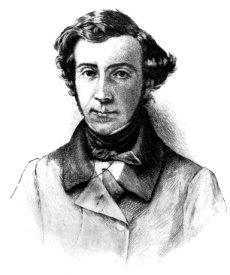But how describe’ the utter confusion in the crowding, the bustling, and the vast variety and volume of sound? Huge white Syrian dromedaries, compared with which those of El-Hejaz appeared mere pony-camels, jingling large bells, and bearing Shugdufs (litters) like miniature green tents, swaying and tossing upon their backs; gorgeous Takhtrawan, or litters carried between camels or mules, with scarlet and brass trappings; Bedawin bestriding naked-backed “Daluls” (dromedaries), and clinging like apes to the hairy humps; Arnaut, Kurd, and Turkish Irregular Cavalry, fiercer looking in their mirth than Roman peasants in their rage; fainting Persian pilgrims, forcing their stubborn camels to kneel, or dismounted grumbling from jaded donkeys; Kahwajis, sherbet sellers, and ambulant tobacconists crying their goods; countrypeople driving flocks of sheep and goats with infinite clamor through lines of horses fiercely snorting and biting and kicking and rearing; towns-people seeking their friends; returned travellers exchanging affectionate salutes; devout Hajis jostling one another, running under the legs of camels, and tumbling over the tents’ ropes in their hurry to reach the Haram; cannon roaring from the citadel; shopmen, water-carriers, and fruit vendors fighting over their bargains; boys bullying heretics with loud screams; a well-mounted party of fine old Arab Shaykhs of the Hamidah clan, preceded by their varlets, performing the Arzah or war dance, —compared with which the Pyrenean bear’s performance is grace itself,—firing their duck-guns upwards, or blowing the powder into the calves of those before them, brandishing their swords, leaping frantically the while, with their bright-colored rags floating in the wind, tossing their long spears tufted with ostrich feathers high in the air, reckless where they fall; servants seeking their masters, and masters their tents, with vain cries of Ya Mohammed ;l grandees riding mules or stalking on foot, preceded by their crowd-beaters, shouting to clear the way; here the loud shrieks of women and children, whose litters are bumping and rasping against one another; there the low moaning of some poor wretch that is seeking a shady corner to die in : add a thick dust which blurs the outlines like a London fog, with a flaming sun that draws sparkles of fire from the burnished weapons of the crowd, and the brass balls of tent and litter; and—I doubt, gentle reader, that even the length, the jar, and the confusion of this description is adequate to its subject, or that any ” wordpainting” of mine can convey a just idea of the scene.
Narrative of a Pilgrimage to Meccah and Medinah, Sir Richard Francis Burton
 As late as 1997 a
As late as 1997 a 